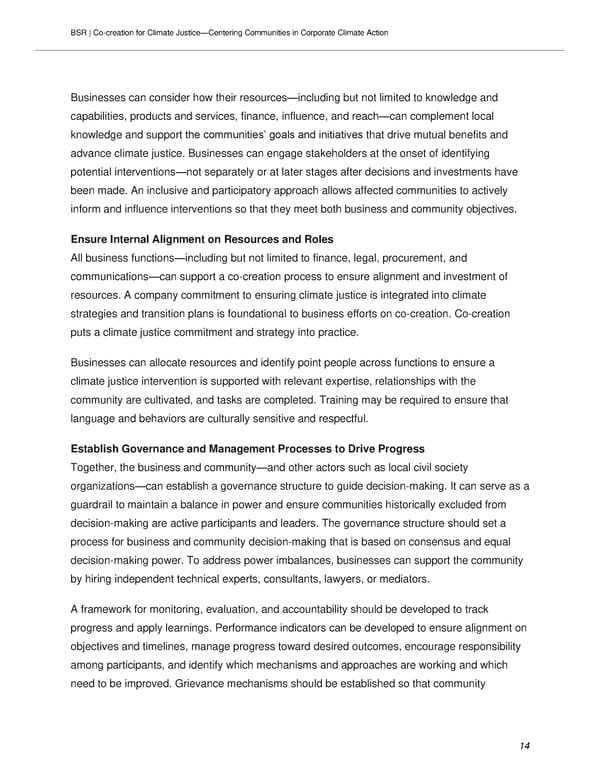BSR | Co-creation for Climate Justice—Centering Communities in Corporate Climate Action Businesses can consider how their resources—including but not limited to knowledge and capabilities, products and services, finance, influence, and reach—can complement local knowledge and support the communities’ goals and initiatives that drive mutual benefits and advance climate justice. Businesses can engage stakeholders at the onset of identifying potential interventions—not separately or at later stages after decisions and investments have been made. An inclusive and participatory approach allows affected communities to actively inform and influence interventions so that they meet both business and community objectives. Ensure Internal Alignment on Resources and Roles All business functions—including but not limited to finance, legal, procurement, and communications—can support a co-creation process to ensure alignment and investment of resources. A company commitment to ensuring climate justice is integrated into climate strategies and transition plans is foundational to business efforts on co-creation. Co-creation puts a climate justice commitment and strategy into practice. Businesses can allocate resources and identify point people across functions to ensure a climate justice intervention is supported with relevant expertise, relationships with the community are cultivated, and tasks are completed. Training may be required to ensure that language and behaviors are culturally sensitive and respectful. Establish Governance and Management Processes to Drive Progress Together, the business and community—and other actors such as local civil society organizations—can establish a governance structure to guide decision-making. It can serve as a guardrail to maintain a balance in power and ensure communities historically excluded from decision-making are active participants and leaders. The governance structure should set a process for business and community decision-making that is based on consensus and equal decision-making power. To address power imbalances, businesses can support the community by hiring independent technical experts, consultants, lawyers, or mediators. A framework for monitoring, evaluation, and accountability should be developed to track progress and apply learnings. Performance indicators can be developed to ensure alignment on objectives and timelines, manage progress toward desired outcomes, encourage responsibility among participants, and identify which mechanisms and approaches are working and which need to be improved. Grievance mechanisms should be established so that community 14
 Co-creating Climate Justice Interventions Between Business and Communities Page 13 Page 15
Co-creating Climate Justice Interventions Between Business and Communities Page 13 Page 15